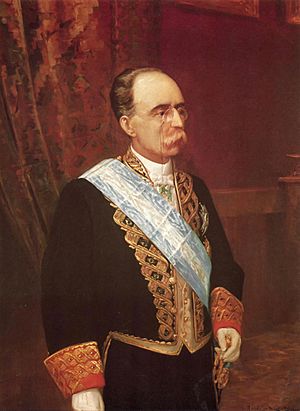Antonio María Fabié facts for kids
Quick facts for kids
Antonio María Fabié
|
|
|---|---|
 |
|
| Born |
Antonio María Fabié Escudero
19 June 1832 Seville, Spain
|
| Died | 3 December 1899 (aged 67) Madrid, Spain
|
| Seat R of the Real Academia Española | |
| In office 24 May 1891 – 3 December 1899 |
|
| Preceded by | Tomás Rodríguez Rubí |
| Succeeded by | Ángel María Dacarrete |
Antonio María Fabié Escudero (born in Seville, Spain, on June 19, 1832 – died in Madrid, Spain, on December 3, 1899) was a very important Spanish person. He was a politician, a writer, and a thinker. He also loved books very much.
Antonio Fabié was interested in a type of thinking called Hegelian Philosophy. He learned about it when he was a student at the University of Sevilla. He studied many different subjects there, including pharmacy, exact sciences, and law.
Contents
A Life of Learning and Public Service
Antonio María Fabié was known for his many talents. He was not just a scholar; he also worked in public service.
Becoming a Member of the Royal Spanish Academy
One of his big achievements was becoming a member of the Real Academia Española. This is a very important group in Spain that looks after the Spanish language. He was chosen for "Seat R" in the Academy. He officially joined on May 24, 1891. He remained a member until he passed away in 1899.
What He Did as a Politician
As a politician, Antonio Fabié held various important roles in the Spanish government. He worked to help his country and its people. His work involved making decisions that affected many parts of Spanish society.
His Contributions as a Writer and Thinker
Beyond politics, Fabié was a respected writer and philosopher. He wrote many books and articles. His writings often explored deep ideas and history. He shared his thoughts on how society worked and how people could live better lives. His love for books, known as bibliophilia, meant he collected many rare and important texts.
See also
 In Spanish: Antonio María Fabié para niños
In Spanish: Antonio María Fabié para niños
 | William Lucy |
 | Charles Hayes |
 | Cleveland Robinson |

